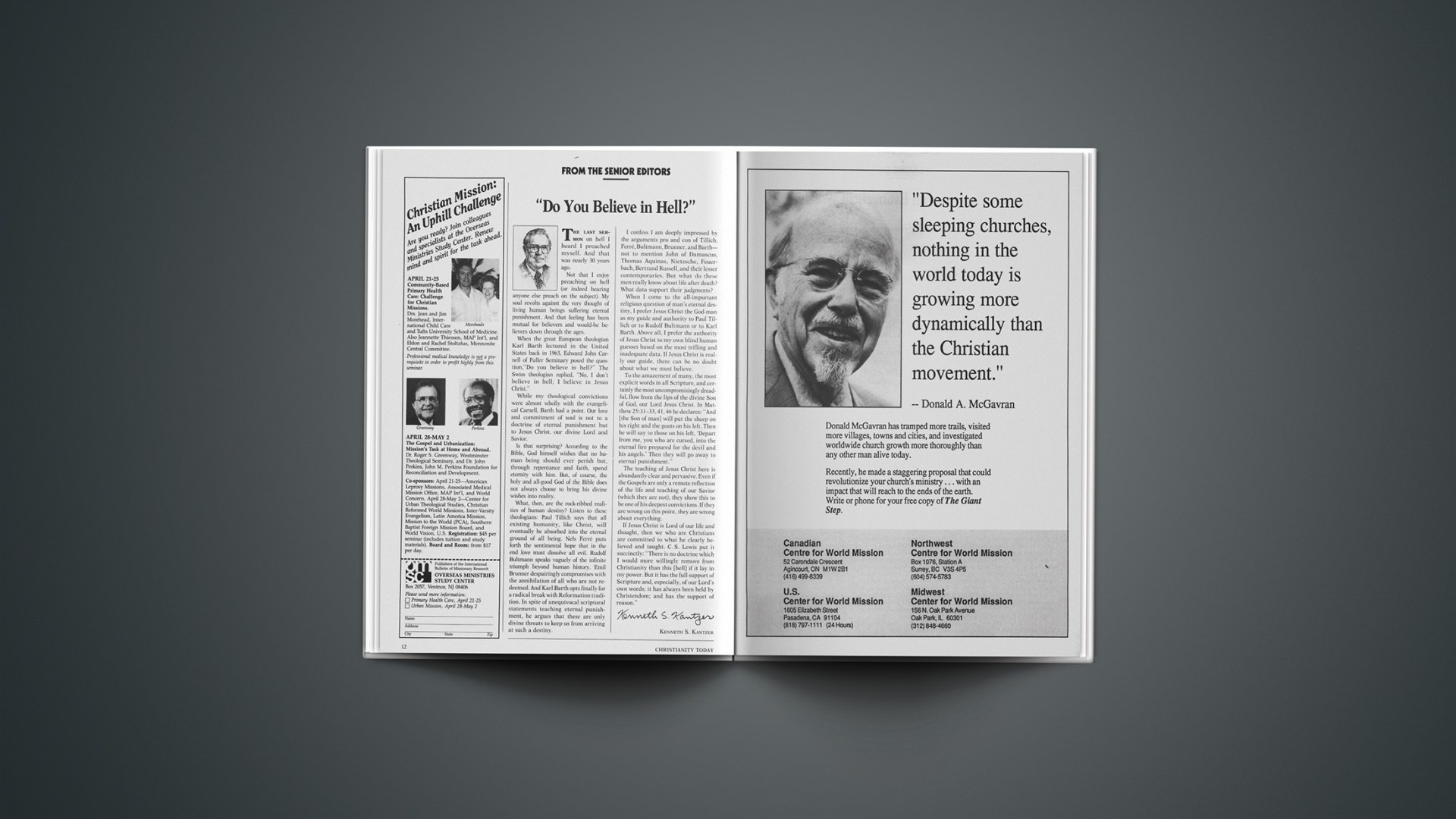The last sermon on hell I heard I preached myself. And that was nearly 30 years ago.
Not that I enjoy preaching on hell (or indeed hearing anyone else preach on the subject). My soul revolts against the very thought of living human beings suffering eternal punishment. And that feeling has been mutual for believers and would-be believers down through the ages.
When the great European theologian Karl Barth lectured in the United States back in 1963, Edward John Carnell of Fuller Seminary posed the question,” Do you believe in hell?” The Swiss theologian replied, “No, I don’t believe in hell; I believe in Jesus Christ.”
While my theological convictions were almost wholly with the evangelical Carnell, Barth had a point. Our love and commitment of soul is not to a doctrine of eternal punishment but to Jesus Christ, our divine Lord and Savior.
Is that surprising? According to the Bible, God himself wishes that no human being should ever perish but, through repentance and faith, spend eternity with him. But, of course, the holy and all-good God of the Bible does not always choose to bring his divine wishes into reality.
What, then, are the rock-ribbed realities of human destiny? Listen to these theologians: Paul Tillich says that all existing humanity, like Christ, will eventually be absorbed into the eternal ground of all being. Nels Ferré puts forth the sentimental hope that in the end love must dissolve all evil. Rudolf Bultmann speaks vaguely of the infinite triumph beyond human history. Emil Brunner despairingly compromises with the annihilation of all who are not redeemed. And Karl Barth opts finally for a radical break with Reformation tradition. In spite of unequivocal scriptural statements teaching eternal punishment, he argues that these are only divine threats to keep us from arriving at such a destiny.
I confess I am deeply impressed by the arguments pro and con of Tillich, Ferré, Bultmann, Brunner, and Barth—not to mention John of Damascus, Thomas Aquinas, Nietzsche, Feuerbach, Bertrand Russell, and their lesser contemporaries. But what do these men really know about life after death? What data support their judgments?
When I come to the all-important religious question of man’s eternal destiny, I prefer Jesus Christ the God-man as my guide and authority to Paul Tillich or to Rudolf Bultmann or to Karl Barth. Above all, I prefer the authority of Jesus Christ to my own blind human guesses based on the most trifling and inadequate data. If Jesus Christ is really our guide, there can be no doubt about what we must believe.
To the amazement of many, the most explicit words in all Scripture, and certainly the most uncompromisingly dreadful, flow from the lips of the divine Son of God, our Lord Jesus Christ. In Matthew 25:31–33, 41, 46 he declares: “And [the Son of man] will put the sheep on his right and the goats on his left. Then he will say to those on his left, ‘Depart from me, you who are cursed, into the eternal fire prepared for the devil and his angels.’ Then they will go away to eternal punishment.”
The teaching of Jesus Christ here is abundantly clear and pervasive. Even if the Gospels are only a remote reflection of the life and teaching of our Savior (which they are not), they show this to be one of his deepest convictions. If they are wrong on this point, they are wrong about everything.
If Jesus Christ is Lord of our life and thought, then we who are Christians are committed to what he clearly believed and taught. C. S. Lewis put it succinctly: “There is no doctrine which I would more willingly remove from Christianity than this [hell] if it lay in my power. But it has the full support of Scripture and, especially, of our Lord’s own words; it has always been held by Christendom; and has the support of reason.”










